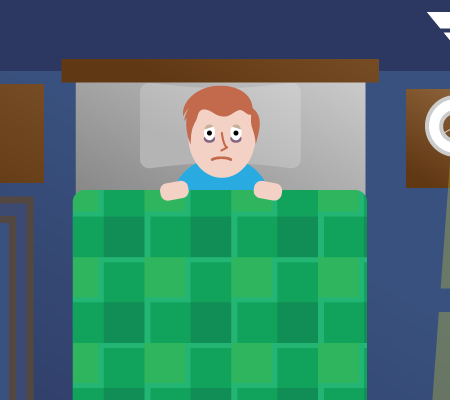
Sleepless nights and anxiety could have an underlying cause – hyperthyroidism. Your doctor can order a blood test to check for an overactive thyroid.
Do you feel anxious, have a racing heart rate or struggle to get to sleep?
Many medical conditions can cause these symptoms, including an overactive thyroid, known as hyperthyroidism.
“Having one or more symptoms doesn’t mean you have hyperthyroidism,” said Dr. Michael Sheehan, a Marshfield Clinic endocrinologist. “Your doctor will need to do lab work to make a diagnosis.”
What is hyperthyroidism?
Hyperthyroidism means the thyroid gland, which is located in your neck, makes and releases too much thyroid hormone. Excess thyroid hormone speeds up your metabolism, which can cause symptoms including:
- Anxiety
- Fast heart rate
- Heart palpitations
- Trouble sleeping
- Tremors
- Frequent bowel movements
- Feeling hot
- Unexplained weight loss
Mild hyperthyroidism may not cause any symptoms or health problems. A more severe case can cause bone loss, an irregular heartbeat and worsen pre-existing heart disease.
An overactive thyroid is less common than an underactive thyroid, known as hypothyroidism. Hyperthyroidism is more common in women than in men.
Three causes of hyperthyroidism
Grave’s disease is an autoimmune disease that causes the majority of hyperthyroidism cases. It’s most likely to affect women ages 20-50 and cause more severe hyperthyroidism.
“The immune system gets confused and makes antibodies that stimulate the thyroid to work harder,” Sheehan said.
Silent thyroiditis is another type of autoimmune disease that causes the thyroid to swell and release its storage pool of thyroid hormone all at once.
Thyroid nodules are a non-autoimmune cause of overactive thyroid. A single nodule or multiple nodules can cause the thyroid to produce excess thyroid hormone. Nodules are a common cause of overactive thyroid in people over 60.
Treatment depends on cause, severity and age
Doctors may choose to watch mild hyperthyroidism in young people and do blood tests every six months to see if it gets more serious.
“A mildly overactive thyroid is treated more aggressively in older adults,” Sheehan said. “Even if they don’t have symptoms, people older than 60 are at higher risk for bone loss and arrhythmia.”
Everyone who has a significantly overactive thyroid should be treated.
Symptoms of silent thyroiditis are treated with medication. The thyroid starts working normally again in a few months.
Grave’s disease can be treated with medication for up to two years. If the thyroid doesn’t start working normally, it’s treated with radioactive iodine, which is a pill that destroys thyroid function. Some patients choose this option right away.
Thyroid nodules are destroyed with radioactive iodine or removed through surgery.
Patients who undergo radioactive iodine treatment or surgery may need lifelong thyroid hormone replacement therapy if the whole thyroid or a significant portion of it is destroyed or removed.
Contact your primary care provider if you think you have symptoms of hyperthyroidism.

